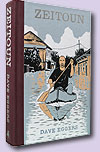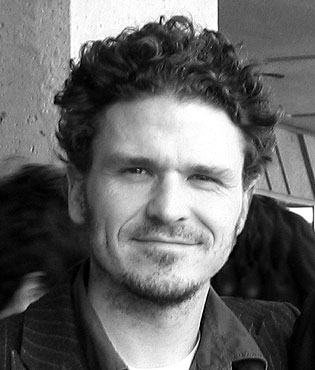

Zeitoun
Hurricane Katrina ravaged the Gulf Coast in the late summer of 2005, causing what is generally
described as the worst natural disaster in American history. But that phrase was never quite
accurate’┐Įnot because the disaster wasn’┐Įt ’┐Įthe worst,’┐Į but because it wasn’┐Įt entirely natural.
Katrina and its aftermath gave rise to some of the finest journalistic investigation and writing
that the country has seen in decades. We now understand the extent to which human error left
New Orleans vulnerable in the first place. We know that the response to the disaster by the
federal and state authorities was both inadequate and, where it existed at all, deeply flawed.
And we know that the tragedy in New Orleans was heightened by the behavior of many individuals
acting alone’┐Įsome of it criminal, some of it ignorant, some of it merely selfish, and some of
it backed by the power of a badge.
But we also know that the catastrophe gave us moments of redemptive power and enduring grace ’┐Į
moments in which individuals somehow transcended the tragedy of their circumstances and stood
squarely for the most fundamental human values. In his book Zeitoun, Dave Eggers tells
the story of one such man, Abdulrahman Zeitoun, a Syrian-born contractor who happens to be Muslim,
and who lives in New Orleans to this day with his American-born wife, Kathy, and his five
children. The arc of the story is, in a sense, simple. As Katrina hit and the waters began to
rise, Zeitoun’┐Įs family was evacuated to safety. He himself remained behind to help in any way
he could ’┐Į because he felt he simply must. In an old canoe, Zeitoun paddled around the
neighborhood. He saved an old woman who had been in the water for an entire day. He paddled on,
saving other people. To still others he brought supplies of food and water. And then, suddenly,
without warning, in a house he himself owned, he was arrested by a SWAT team and held
incommunicado on suspicion of being a looter, perhaps even a terrorist. Months elapse before
Zeitoun is released, and before his family reunited.
So: a simple arc. But the story is by no means simple. Or to put it another way, it is as simple
as any profound exploration of human character and motivation; as simple as any study of human
courage; as simple as any investigation of an ordinary individual confronted with forces, natural
and man-made, that threaten to turn his world upside down. Eggers unfolds the story in prose
that is calm, clean, utterly restrained ’┐Į the book offers a master class in creative nonfiction,
and a reminder that the highest art is achieved when the artistry seems to disappear. Zeitoun
is that rare thing, a book that is destined to be both loved and taught, and a book with the
potential to being change to our lives, one stroke of the paddle at a time.
-Cullen Murphy, 2010 finalist judge
Editor at Large of Vanity Fair
2008 Nonfiction runner-up for Are We Rome?
NOTE: Funds from the sale of Zeitoun go to the Zeitoun Foundation, which was established by
the Zeitoun family, Dave Eggers, and McSweeney’┐Įs magazine. The foundation is dedicated to
’┐Įthe continued rebuilding and social advancement of New Orleans’┐Į and to the promotion of
understanding ’┐Įbetween people of disparate faiths around the world, with a concentration
on relations between America and the Muslim world.’┐Į
|
|
 |

2010 Nonfiction Winner


(Click photo to see acceptance speech at awards dinner.)
Dave Eggers
Zeitoun
Dave Eggers is the author of seven books. His book What Is the What? was a finalist for the
2006 National Book Critics Circle Award and winner of France's Prix M’┐Įdicis ’┐Įtranger. That book,
about Valentino Achak Deng, a survivor of the civil war in southern Sudan, gave birth to the
Valentino Achak Deng Foundation, run by Mr. Deng and dedicated to building secondary schools in
southern Sudan.
Mr. Eggers's most recent book, Zeitoun, was awarded the American Book Award, LA Times Book Award,
Northern California Book Award, the Robert F. Kennedy Distinguished Honor, and the Muslim Public
Affairs Council's Media Award. Eggers is the founder and editor of McSweeney's, an independent
publishing house based in San Francisco that produces a quarterly journal, a monthly magazine
(The Believer), and Wholphin, a quarterly DVD of short films and documentaries.
In 2002, with Ninive Calegari, he co-founded 826 Valencia, a nonprofit writing and tutoring center
for youth in the Mission District of San Francisco. Local communities have since opened sister
826 centers in Chicago, Los Angeles, Brooklyn, Ann Arbor, Seattle, Boston, and D.C. In 2004,
Eggers taught at the University of California-Berkeley Graduate School of Journalism, and there,
with Dr. Lola Vollen, he co-founded Voice of Witness, a series of books using oral history to
illuminate human rights crises around the world.
* * *
"This honor means the world to me, and I share this with the Zeitoun family, who had faith in
me to tell their story. This award comes at an interesting moment, when Muslims in America are
experiencing a new wave of xenophobia and unfounded suspicion. Meanwhile, the Zeitouns have
been speaking at colleges, at temples and churches, and everywhere they go people of all faiths
tell them that they're the all-American family, and each appearance ends in mutual admiration
and respect. Which means, ultimately, that listening to each other, getting to know the people
behind the headlines, the shrill debates, means everything. If we begin to listen to each other,
to listen before speaking ’┐Į before judging ’┐Įthen we go a long way toward a more empathetic and
peaceful world."
’┐ĮDave Eggers
|
|